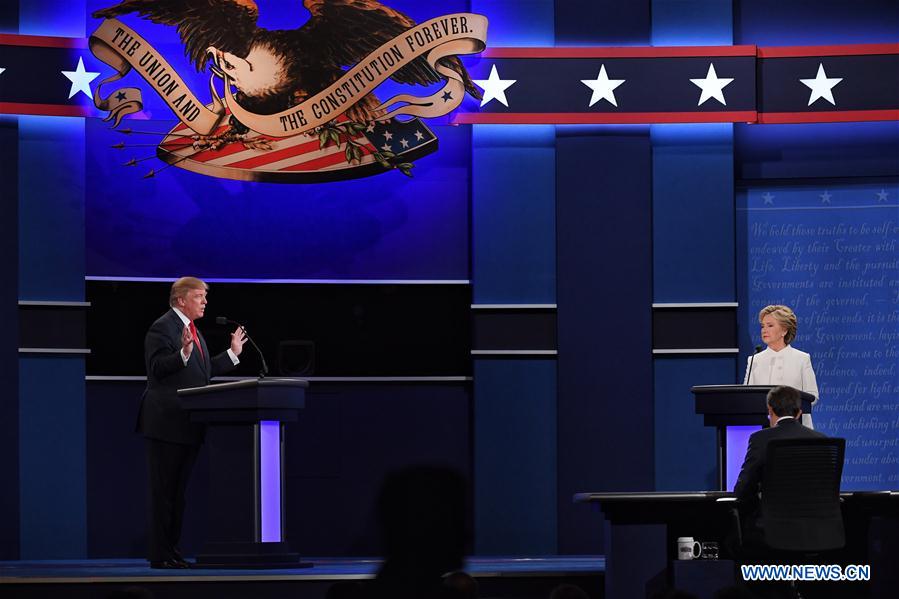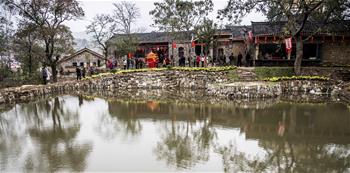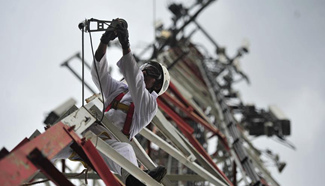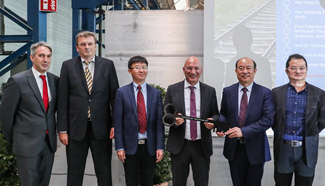
Republican presidential candidate Donald Trump (L) and Democratic presidential candidate Hillary Clinton participate in the third and final presidential debate at the University of Nevada Las Vegas (UNLV) in Las Vegas, Nevada, the United States, Oct.19, 2016.(Xinhua/Yin Bogu)
By Chen Yanbei and Guo Shuang
LOS ANGELES, Nov. 2 (Xinhua) -- Data science tools are playing an increasingly important role in U.S. politics, not only in predicting the results of elections, but in actively helping the campaigns win.
An Artificial Intelligence (AI) system from an Indian startup company claimed that Republican presidential nominee Donald Trump is more popular in 2016 than Barack Obama in 2008, and predicted that Trump will go on to win the U.S. presidential election of 2016.
The prediction was made by MogIA, a software developed by the Indian startup company Genic.ai. The software gathered 20 million data points from public platforms including Google, Facebook, Twitter and YouTube, and made its prediction based on factors like the engagement of users with tweets or live videos of Trump.
"If Trump loses, it will defy the data trend for the first time in the last 12 years since Internet engagement began in full earnest," Sanjiv Rai, founder of the company wrote in a report.
He referred to the fact that the software was able to correctly predict the outcomes of the previous three presidential races, as well as the Democratic and Republican primaries.
"This appears to be a novel type of predictive model, based on analysis of sentiment from social media sites," said R. Michael Alvarez, professor of Political Science at the California Institute of Technology, in an interview with Xinhua.
However, Alvarez, an expert on elections, cautioned that there needs further study on such methods, warning that social media users are not representative samples of the American electorate, and that the opinions expressed online may or may not reflect their true preferences for the candidates.
"Extracting sentiment from social media data can be tricky, at best ... I don't think that we should just stop traditional opinion polling just yet," said Alvarez.
Another scholar of political science who refused to give his name commented that applying data science tools without actually understanding how politics works may lead to misguided results.
In the past decade, with the rise of social media, data science has been applied to politics, not only in predicting election results, but also in actively helping political campaigns win elections.
"The Obama campaigns in 2008 and 2012 used big data and machine learning tools in new and effective ways," Alvarez said. He went on to explain that, based on the massive data the campaigns collect on the preferences and behaviors of voters in the battleground states, they are able to identify specific voters, and target them with persuasive messages and motivate them to go vote. This allows the campaigns to most effectively allocate their resources.
Data science has become so important to politics that it is being incorporated into undergraduate political science curricula at universities. In 2015, Stanford University started offering a data science track for its political science majors.
Data science tools are not only an important part of presidential politics in the United States, they have also been used by federal and state legislative campaigns. In many states, like California, statewide campaigns use machine learning and sophisticated big data techniques to identify supporters, and to help connect with those supporters in cost-effective ways.
For smaller-scale campaigns which do not hire their own data scientists, a number of private firms are now providing modeling services. In many cases, organizations like the Democratic Congressional Campaign Committee try to provide access to modeling services to Democratic congressional campaigns.












